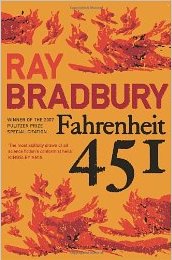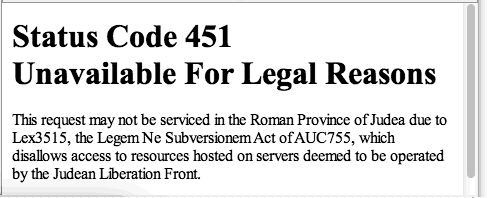I was really pleased to see that Alessio Malizia has just started to blog. An early entry is a link to a Guardian article about Tim Bray‘s suggestion for a new status code of 451 when a site is blocked for legal reasons.
Bray’s tongue-in-cheek suggestion is both honouring Ray Bradbury, the author of Faranheit 451, and also satirising the censorship implicit in IP blocking such as the UK High Court decision in April to force ISPs to block Pirate Bay.
However, I have a feeling that perhaps the satire could be seen, so to speak, as on the other foot.
 Faranheit 451 is about a future where books are burnt because they have increasingly been regarded as meaningless by a public focused on quick fix entertainment and mindless media: censorship more the result than the cause of societal malaise.
Faranheit 451 is about a future where books are burnt because they have increasingly been regarded as meaningless by a public focused on quick fix entertainment and mindless media: censorship more the result than the cause of societal malaise.
Just as Huxley’s Brave New World seemed to sneak up upon us until science fiction was everyday life, maybe Bradbury’s world is here with the web itself not the least force in the dissolution of intellectual life.
Bradbury foresaw ‘firemen’ who burnt the forbidden books, following in a long history of biblioclasts from the destruction of the Royal Library of Ashurbanipal at Ninevah to Nazi book burnings in the 1930s. However, today it is the availability of information on the internet which is often used as an excuse for the closure of libraries, and publishers foresee the end of paper publication in the next five years.
Paradoxically it is the rearguard actions of publishers (albeit largely to protect profit not principle) that is one of the drivers behind IP blocking and ‘censorship’ of copyright piracy sites. If I were to assign roles from Faranheit 451 to the current day protagonists it would be hard to decide which is more like the book-burning firemen.
Maybe Faranheit 451 has happened and we never noticed.
